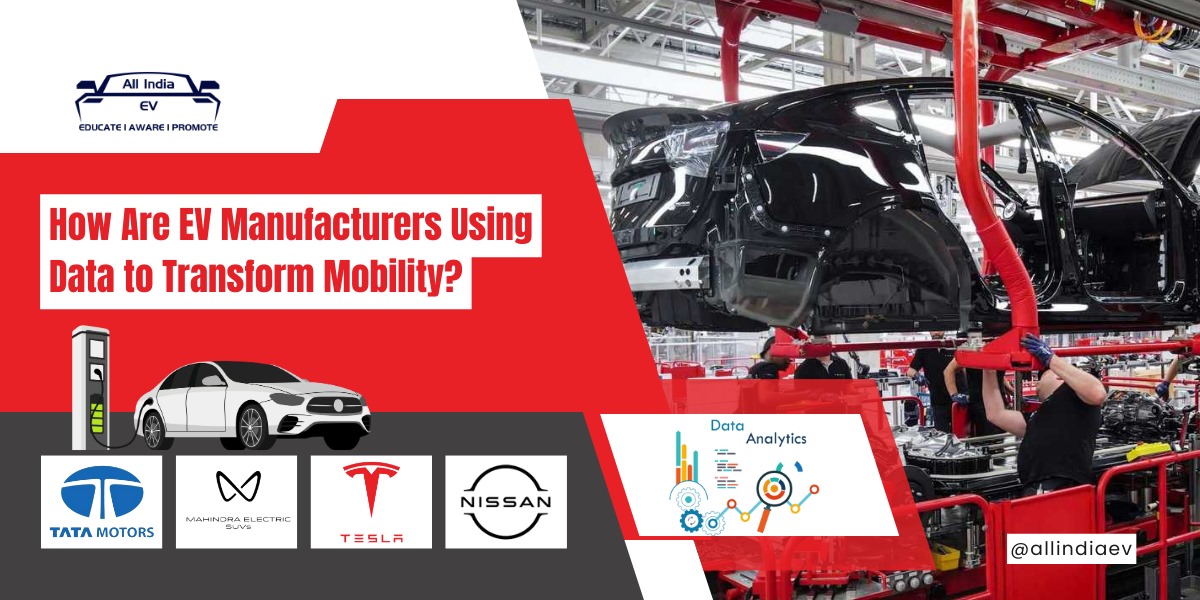
Electric Vehicles: The Data-Driven Revolution in Mobility and Infrastructure
The electric vehicle (EV) industry is rapidly transforming from traditional vehicle manufacturing to becoming a cornerstone of the data economy. EV manufacturers, both in India and globally, are leveraging vast amounts of data generated by their vehicles to enhance battery performance, optimize charging station networks, and improve road infrastructure. This article delves into how data is reshaping the EV landscape and how EV Manufacturers are using the data for the broader implications for related industries.
The Core of EVs: Motors, Batteries, and Data
At the heart of every electric vehicle lies the motor and battery system. Unlike conventional internal combustion engines, these components’ performance is highly sensitive to various factors such as road conditions, temperature, and driving habits. Integrated IoT devices continuously monitor and transmit data on these variables, creating a dynamic feedback loop that allows for real-time optimization and long-term improvements.
Real-Time Data Collection
EVs are equipped with a myriad of sensors and IoT devices that collect data on:
- Battery health and efficiency
- Motor performance
- Energy consumption patterns
- Vehicle speed and acceleration
- Environmental conditions
This data is then processed and analyzed to provide insights into how these factors interplay and affect overall vehicle performance.
Enhancing Battery Performance
Battery technology is the lifeblood of electric vehicles, and data plays a crucial role in its advancement. EV manufacturers use data analytics to:
- Optimize Battery Life: By analyzing driving patterns and environmental data, manufacturers can develop algorithms that manage battery usage more efficiently, extending the battery’s lifespan.
- Predictive Maintenance: Data helps in predicting potential battery failures before they occur, allowing for timely maintenance and replacements, thus reducing downtime and improving reliability.
- Performance Tuning: Continuous data feedback allows for fine-tuning of battery management systems to enhance performance under varying conditions.
Expanding Charging Infrastructure
One of the significant challenges for the EV industry is the development of a comprehensive and efficient charging infrastructure. Data from electric vehicles is pivotal in addressing this challenge:
- Optimal Location Planning: By analyzing the routes and usage patterns of EVs, manufacturers can identify high-traffic areas and potential gaps in the charging network. This information is invaluable for charging station companies to strategically expand their network.
- Usage Forecasting: Data helps in predicting future demand for charging stations, allowing companies to scale their operations in line with projected growth in EV adoption.
- Enhancing User Experience: Real-time data on charging station availability and wait times can be communicated to drivers, improving the overall convenience and experience of using EVs.
Impact on Road Infrastructure
The data collected by electric vehicles also offers significant benefits for road infrastructure planning and maintenance:
- Road Condition Monitoring: Sensors on EVs can detect and report road conditions, such as potholes and surface wear, in real time. This data helps authorities prioritize and address maintenance needs more effectively.
- Traffic Management: Data on vehicle movements can assist in optimizing traffic flow and reducing congestion, leading to more efficient use of existing road infrastructure.
- Urban Planning: Insights gained from EV data can inform broader urban planning initiatives, including the design of future transportation networks and the integration of smart city technologies.
Case Studies: How EV Manufacturers are using Data Points
Tata Motors
🔺Battery Performance: Tata Motors uses data analytics to track battery performance across different regions. For instance, their data shows that in metropolitan areas like Mumbai and Delhi, battery efficiency can vary by up to 15% due to traffic conditions and temperature fluctuations.
🔺Fleet Management: Tata’s EV fleet management systems utilize real-time data to optimize routes and reduce energy consumption. Data has shown a reduction in energy usage by 12% on average across their commercial EV fleet.
Mahindra Electric
🔺Telematics and Predictive Maintenance: Mahindra Electric’s telematics system monitors over 150 data points per vehicle, predicting maintenance needs before issues arise. This proactive approach has led to a 20% reduction in unplanned maintenance and a 10% increase in vehicle uptime.
🔺Consumer Insights: By analyzing driving patterns and usage data, Mahindra has tailored its EV offerings to better suit Indian consumers, leading to a 25% increase in customer satisfaction scores.
Tesla
🔺Autopilot System: Tesla’s Autopilot collects data from over a million vehicles worldwide, processing billions of miles of driving data. This extensive dataset has allowed Tesla to improve its self-driving algorithms, reducing accidents by approximately 40% when Autopilot is engaged.
🔺Battery Management: Tesla uses real-time data to manage its battery packs, adjusting parameters for optimal performance and longevity. Their data indicates a 10% improvement in battery life due to these optimizations.
Nissan
🔺Charging Pattern Analysis: Nissan has gathered data from over 500,000 Leaf vehicles globally. This data has revealed that urban users charge their vehicles 25% more frequently than rural users, influencing Nissan’s strategy to develop more urban charging stations.
🔺Vehicle-to-Grid (V2G) Integration: Nissan’s V2G systems leverage data to allow EVs to supply power back to the grid. Data from pilot projects in Denmark and the UK show that V2G can reduce peak electricity demand by up to 10%, highlighting its potential in smart grid applications.
Conclusion
The transition from traditional vehicle manufacturing to data-driven mobility solutions marks a significant shift in the automotive industry. Electric vehicle manufacturers are not just producing vehicles; they are generating and utilizing vast amounts of data that drive innovation in battery technology, charging infrastructure, and road maintenance. This data-centric approach is paving the way for a smarter, more efficient, and sustainable future in transportation.
As the EV industry continues to grow, the synergy between data and technology will only become more pronounced, offering new opportunities and challenges for manufacturers, infrastructure providers, and policymakers alike. The journey has just begun, and the road ahead promises to be as electrifying as the vehicles that traverse it.




